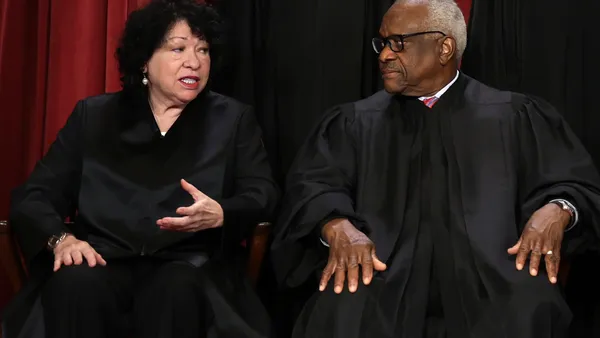Dive Brief:
- Perdue Foods has settled a claim that it put a pregnant laborer on involuntary leave, Jan. 12 court documents from the U.S. District Court for the Middle District of Georgia show (Thomas v. Perdue Foods LLC).
- The plaintiff alleged that after calling out of work for several days due to an infection, the employer prevented her from returning to work. She had requested regular access to water and a bathroom in order for her to return, according to the complaint, but an HR manager determined the company would not accommodate her. Instead, Perdue said she would take leave and suggested she apply for short-term disability benefits. It eventually fired her, allegedly citing her extended absence.
- The employee sued, alleging Perdue’s actions ran afoul of several federal laws, including the Americans with Disabilities Act and the Pregnancy Discrimination Act. The parties settled but the terms of the agreement were not made public. Perdue did not immediately respond to a request for comment.
Dive Insight:
The violations alleged in Thomas took place in 2020, and federal pregnancy nondiscrimination law has received a significant update since then.
The ADA requires employers to accommodate workers with disabilities and favors an interactive process between the employee and employer. It explicitly excludes uncomplicated pregnancies, however. To close the gap between that law and the PDA — which doesn’t explicitly require accommodation, Congress passed the Pregnant Workers Fairness Act in late 2022.
The PWFA contains similar language to the ADA but goes further. It explicitly prohibits employers from requiring an employee to take paid or unpaid leave if another reasonable accommodation can be provided, for example.
Implementing regulations are still forthcoming, but proposed rules suggested the U.S. Equal Employment Opportunity Commission’s final rule will likely track its ADA regulations.
The agency included a list of accommodations that would not impose an undue hardship on an in employer in “virtually all” cases. The list included increased access to water and restrooms.
Still, some employer representatives have asked EEOC to narrow its proposal. The Society for Human Resource Management, for example, requested that EEOC require that workers be asked to provide documentation for accommodation requests, unless the need is obvious. It also requested examples of accommodations that could be unreasonable and sought a shortened time period for accommodation eligibility.













